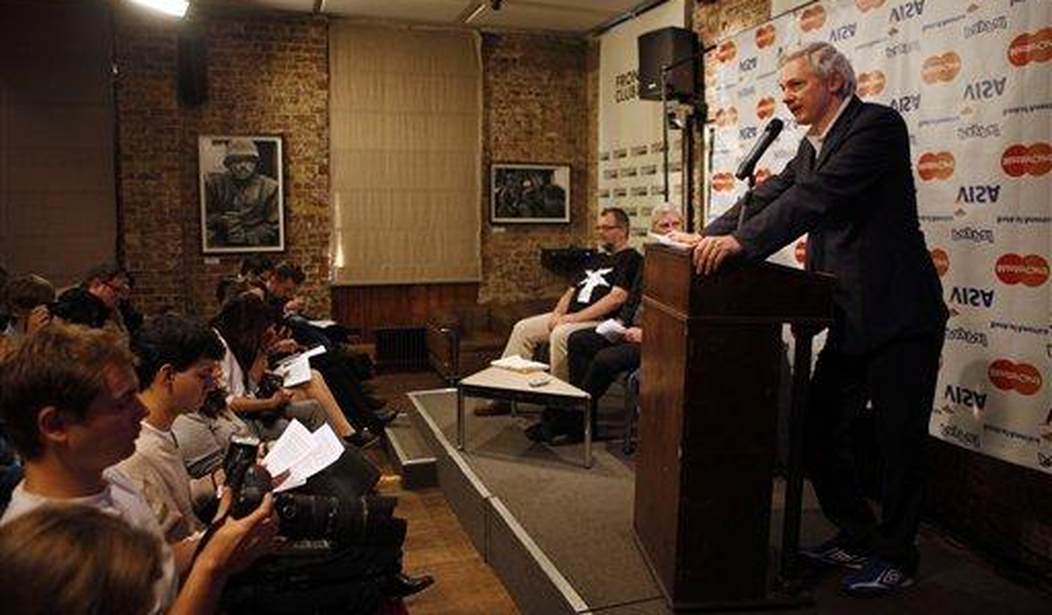"Publishing is not a crime," the editors and publishers of The New York Times and four leading European news outlets say in an open letter released on Monday. While that statement might seem uncontroversial, the U.S. Department of Justice disagrees, as evidenced by its prosecution of WikiLeaks founder Julian Assange for obtaining and disseminating classified material.
In urging the Justice Department to drop that case, the Times, The Guardian, Le Monde, Der Spiegel and El Pais implicitly acknowledge that freedom of the press is meaningless when the government decides who is allowed to exercise it. Although that point also might seem obvious, journalists who take a dim view of Assange have long argued that attempting to imprison him for divulging government secrets poses no threat to their work because he does not qualify as a member of their profession.
That position is profoundly ahistorical. As scholars such as UCLA law professor Eugene Volokh have shown, the "freedom ... of the press" guaranteed by the First Amendment protects your right to communicate with the public through the printed word and other tools of mass communication, regardless of whether you do that for a living or work for a mainstream news organization.
The Assange exception to the First Amendment is also dangerously shortsighted. As the Times et al. emphasize, the conduct at the center of the case against him is indistinguishable from what professional journalists do every day when they reveal information that the government wants to conceal.
Twelve years ago, those newspapers published a series of startling stories based on confidential State Department cables and military files that Assange had obtained from former Army intelligence analyst Chelsea Manning. Those documents, the open letter notes, "disclosed corruption, diplomatic scandals and spy affairs on an international scale."
Recommended
As the Times put it at the time, the records told "the unvarnished story of how the government makes its biggest decisions, the decisions that cost the country most heavily in lives and money." The revelations, Times reporter Charlie Savage notes, included "dossiers about Guantanamo Bay detainees being held without trial" and "logs of significant events in the Afghanistan and Iraq wars" that showed "civilian casualties were higher than official estimates."
All but one of the 17 counts in the latest federal indictment of Assange relate to obtaining or disclosing such "national defense information," a felony punishable by up to 10 years in prison under the Espionage Act of 1917. Once the U.S. has completed his extradition from the U.K., Assange will face a maximum sentence of 160 years on those counts alone.
Journalists who reported the information that Assange obtained are guilty of the same crimes, a daunting fact that poses an obvious threat to freedom of the press. Largely for that reason, no publisher of previously secret government information has ever been prosecuted under the Espionage Act until now, and the Obama administration, which hardly looked kindly on Assange, declined to establish that chilling precedent.
The Trump administration took a different view. John Demers, then head of the Justice Department's National Security Division, assured reporters there was no cause for alarm because Assange is "no journalist," and it "has never been the Department's policy to target" officially recognized journalists "for their reporting."
The Times et al. are not blind to Assange's deviations from journalistic norms, which included his alleged involvement in Manning's unauthorized use of government computers and his publication of unredacted documents that may have endangered intelligence sources. But they recognize that the Justice Department's position means prosecutorial discretion is the only thing that protects "real" journalists, however that category is defined, from a similar fate.
So do Reps. Ro Khanna (D-Calif.) and Thomas Massie (R-Ky.), who this past summer introduced a bill that would amend the Espionage Act to protect journalists and whistleblowers. "The ongoing attempts to prosecute journalists like Julian Assange under the Espionage Act," Massie said, "should be opposed by all who wish to safeguard our constitutional rights."

























Join the conversation as a VIP Member